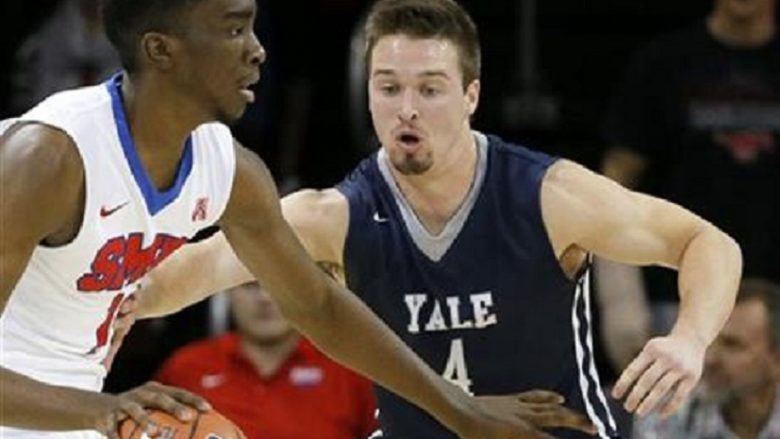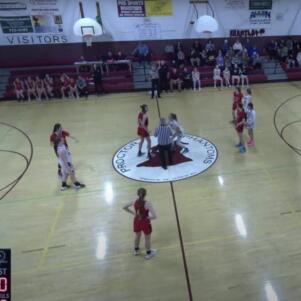Ex-Yale hoops star sues school over expulsion by Title IX tribunal
By Evan Lips | June 9, 2016, 22:56 EDT
 Then-Yale University basketball team captain Jack Montague before he got expelled for a transgression he said he didn’t commit. (AP photo)
Then-Yale University basketball team captain Jack Montague before he got expelled for a transgression he said he didn’t commit. (AP photo) NEW HAVEN – The former captain of the Yale University men’s basketball team has sued the Ivy League school for defamation and breach of contract, claiming the university unfairly expelled him after a secret Title IX tribunal decided that his relationship with a fellow student constituted sexual assault, despite his claim that the relationship was consensual.
Jack Montague, of Brentwood, Tennessee, was expelled from Yale in February, in the midst of his senior year and final basketball season, after the University Wide Committee on Sexual Misconduct ruled that he had assaulted a female student the previous academic year. Montague has maintained that the relationship was on-going and consensual.
Montague led the Bulldogs hoops team to a berth in the National Collegiate Athletic Association’s national tournament, its first appearance in the prestigious NCAA competition since 1962. He was booted out before the team could play its first-round game, however.
Lawyers for Montague say Yale administrators were on a mission to appear tough on campus assault and “targeted” the basketball star in order to make a “public example of a prominent male figure on campus.” They point out that the complaint against Montague was brought by university bureaucrats, not the alleged victim, and wasn’t filed for more than a year after the alleged assault took place.
The searing 53-page complaint filed Thursday in the U.S. District Court for Connecticut offers graphic details of allegedly consensual sexual encounters between Montague and the female student, referred to in the complaint as “Jane Roe,” before delving into the process Yale administrators used to expel him.
According to Montague, on four occasions in the fall of 2014, he and Roe slept together in his room. On all four occasions, the pair had sexual contact but had intercourse only during the third and fourth encounters. The only disputed episode is the fourth occasion, on which Montague says the intercourse was consensual and Roe claims it was not.
Roe did not report the incident, and Montague’s lawsuit claims that she was “not interested” in doing so. Instead, the suit claims that Roe was pressured into cooperating with a formal complaint filed on her behalf in Novemeber 2015 by Angela Gleason, a Yale Title IX coordinator, after Roe’s suitemate “took it upon herself” to tell Gleason that Roe had had a “bad experience” with Montague.
On Jan. 15, Montague was informed for the first time of the details of Roe’s claims.
On Jan. 21, Montague participated in a hearing accompanied by his adviser, Yale basketball coach James Jones. Montague claims in his suit that administrators never told him he would be allowed to deliver a prepared statement – even though administrators “encouraged” Roe to write one.
Yale defines sexual assault as “any kind of nonconsensual sexual contact, including rape, groping and any other nonconsensual sexual touching.” It defines consent as a “positive, unambiguous and voluntary agreement” that “cannot be inferred from the absence of a ‘no’” and “cannot be obtained from someone who is asleep or otherwise mentally or physically incapacitated, whether due to alcohol, drugs or some other condition.”
The five-member panel by secret vote found that the “preponderance of the evidence” favored the accuser’s version of events. School policy states that the “panel will reach its conclusions by a majority vote and by secret ballot, with no abstentions allowed.”
Yale, like many universities across the country, adopted the “preponderance of evidence” standard for adjudicating claims of sexual-assault after the U.S. Department of Education’s Office for Civil Rights in 2011 warned schools that not doing so would result in a loss of federal funding under Title IX. Previously, most universities did not find an accused student guilty unless there was “clear and convincing evidence” that an assault had taken place. Courts of law use the even more exacting standard of proof “beyond a reasonable doubt” in determining criminal culpability.
The university expelled Montague on Feb. 10, just prior to the start of the NCAA basketball tournament. Yale and New Haven police were not involved in the investigation, and Montague has not been charged with any crime in connection with the allegations.
Montague’s lawsuit against Yale includes a new wrinkle unmentioned in previous reports of the expulsion. The suit claims Gleason, the Title IX coordinator, used an earlier incident “completely unrelated to sexual assault” to convince Roe that the basketball star had a dark history with women.
The unrelated incident, in which Montague engaged in a late-night conversation outside a pizzeria with a female student before “appearing to be annoyed” and shoving a rolled-up paper plate down the front of the other student’s shirt, occurred at the end of Montague’s freshman year — two years prior to the alleged assault of Roe.
The following school year, the paper plate incident was was the basis of a Title IX complaint filed against Montague. Montague “accepted full responsibility” for the incident and said he was “embarrassed and ashamed” of his behavior, according to the recently filed lawsuit.
“Under Yale’s own policies and definitions, however, Montague’s conduct did not constitute ‘sexual harassment,’” the legal papers assert. “Montague’s conduct was not ‘conduct of a sexual nature,’ nor did the panel find any conduct that could reasonably be construed as ‘sexual.’”
But Montague alleges that the freshman year incident biased administrators against him and that, upon hearing his name from Roe’s suitemate, Gleason sought to convince Roe to accuse Montague.
The lawsuit claims Gleason violated the school’s confidentiality policies when she revealed the details of Montague’s earlier disciplinary incident. Montague’s complaint further alleges that Gleason incorrectly implied that pushing the paper plate into a female’s shirt constituted sexual assault and suggesting that Montague had been subject to “training on consent” as a result of the earlier incident.
“In reality, of course, Montague had received no training ‘on consent,’” his lawyers state in the complaint.
The lawyers also cite other instances in which Yale officials declined to expel students who had allegedly committed far more egregious acts, instead issuing written reprimands and assigning gender sensitivity training.
“Yale’s history of imposing penalties for non-consensual sex demonstrates that in almost all cases the sanction for such conduct is something less than expulsion. Indeed, prior to Montague’s expulsion, Yale had expelled only three other students between July 1, 2011, and June 30, 2015, for non-consensual sexual conduct, demonstrating that it is an extreme sanction imposed in only the most serious circumstances,” the lawsuit claims.
The complaint also delves into the history of Title IX policies, pointing out a shift and apparent disregard for due process after the U.S. Department of Education in 2011 directed schools to adopt a “preponderance of the evidence” standard for adjudicating such cases.
The lawsuits points out that after ranking third-worst out of 27 colleges and universities in a voluntary survey on sexual misconduct, Yale “fell under the watchful eye” of the federal government.
“In short, Yale knew its students were paying close attention to the issue of sexual misconduct on campus, and that they had strong views on how Yale had responded, historically, to complaints of sexual assault,” the lawsuit states. “It was in this climate – permeated by deep mistrust and anger amongst Yale students and near-panic on the part of Yale administrators – that the defendants misled and pressured a female student, against her original wishes, to participate in a formal complaint process against Jack Montague, accusing him of sexual assault.”
Reached Thursday, Yale University officials issued a statement ripping Montague’s claims.
“The lawsuit is factually inaccurate and legally baseless, and Yale will offer a vigorous defense,” the school said in the statement.
Karen Schwartzman, a Boston-based spokeswoman for the former student, said he and his lawyers wouldn’t respond to Yale’s statement.
In addition to naming the university and Gleason as defendants, Montague also named Jason Killheffer, the school’s senior deputy Title IX coordinator. Last fall, Killheffer was shown on camera tearing up a copy of the U.S. Constitution, ostensibly because it offended a student. The film, shot by Project Veritas, an undercover journalism group headed by James O’Keefe, was created on several campuses where similar incidents were recorded.
Montague’s lawsuit comes just months after a federal judge in Boston dismissed Brandeis University’s attempts to dismiss a lawsuit filed by a student there who claimed he was unfairly punished and denied due process in handling sexual misconduct allegations against him.
Montague is seeking reinstatement to Yale or the reopening of the disciplinary proceedings, plus monetary damages.
Read a full copy of Montague’s lawsuit against Yale here:








